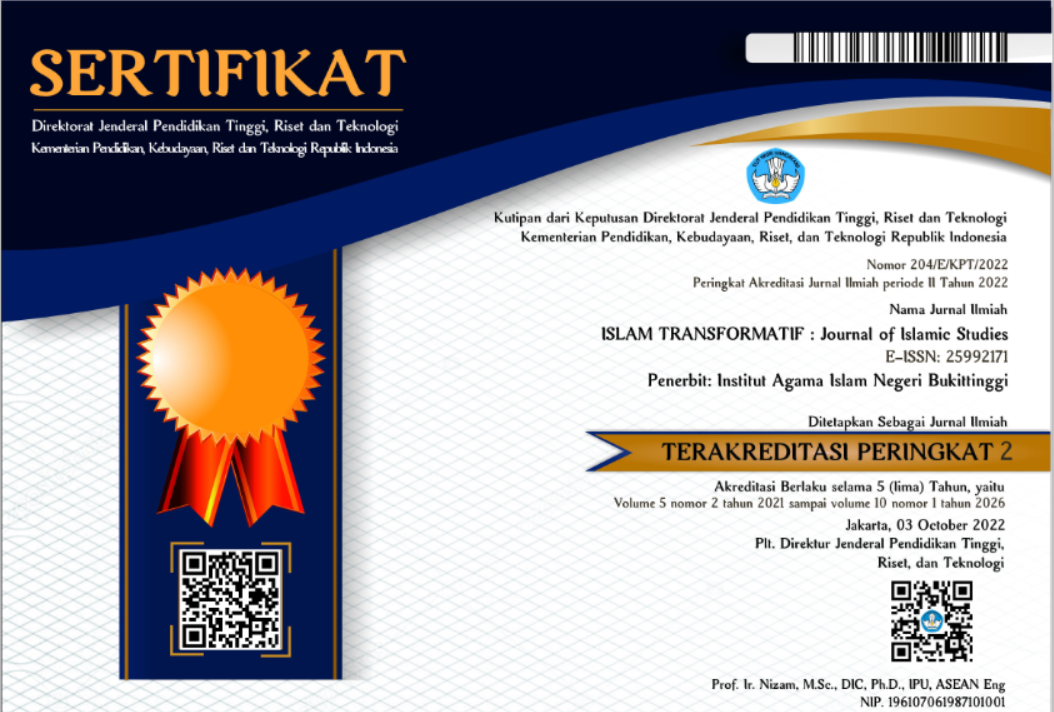MTQ ; Antara Seni Membaca Alquran dan Politik Akomodasionis Pemerintah terhadap Umat Islam
DOI:
https://doi.org/10.30983/it.v2i2.747Abstract
References
Ayoub, Mahmoud. “The Qur’an Recitedâ€, dalam http://w3fp.arizona.edu/mesassoc/Buletin/Ayoub
Effendy, Bachtiar. Islam dan Negara: Transformasi Pemikiran dan Praktek Politik Islam di Indonesia, Jakarta: Paramadina, 1998
Irwan Abdullah, dkk (Ed), Dialektika Teks Suci Agama: Strukturisasi Makna Agama dalam Kehidupan Masyarakat, Yogyakarta: Pustaka Pelajar, 2008
LPTQ, 25 Tahun Musabaqah Tilawatil Qur’an dan 17 tahun Lembaga Pengembangan Tilawatil Qur’an, Jakarta: Lembaga Pengembangan Tilawatil Qur’an Tingkat Nasional, 1415H/1994 M
LPTQ Provinsi DKI Jakarta, Dari Jakarta Untuk Indonesia Sejarah LPTQ Provinsi DKI Jakarta, Jakarta: LPTQ Provinsi DKI Jakarta, 2008
Manzur, Ibn. Lisân al-‘Arab, Ttp: Dâr Ihya’ al-Turast al-‘Araby, 630 H
Al-Nawâwî, Abu Zakariya bi Syarf. al-Tibyân fi Ādâb Hamalah al-Qur’an, Beirut: Dâr Ibn Hazm, tth
Nelson, Christina. The Art of Reciting the Qur’an, USA: University of Texas Press, 1985
Pradopo, Rachmat Djoko. “Estetika Resepsi dan Teori Penerapannyaâ€, dalam Sulastri Sutrisno (Ed) dkk, Bahasa, Sastra, dan Budaya, Yogyakarta: UGM Press, 1991
Salim, Hairus. “Sejarah Kebijaksanaan Kerukunan†dalam BASIS, Tahun ke-53 No. 01-02, Januari- Februari 2004
Shihab, Quraish. Mu’jizat al-Qur’an, Bandung: Mizan, 1997
Thaba, Abdul Aziz. Islam dan Negara dalam Politik Orde Baru. Jakarta: Gema Insani Press, 1996
Downloads
Published
How to Cite
Issue
Section
Citation Check
License
Authors who publish with this journal agree to the following terms:
- Authors retain copyright and grant the journal right of first publication with the work simultaneously licensed under a Creative Commons Attribution-ShareAlike 4.0 International License that allows others to share the work with an acknowledgment of the work's authorship and initial publication in this journal.
- Authors are able to enter into separate, additional contractual arrangements for the non-exclusive distribution of the journal's published version of the work (e.g., post it to an institutional repository or publish it in a book), with an acknowledgment of its initial publication in this journal.
- Authors are permitted and encouraged to post their work online (e.g., in institutional repositories or on their website) prior to and during the submission process, as it can lead to productive exchanges, as well as earlier and greater citation of published work (See The Effect of Open Access).




